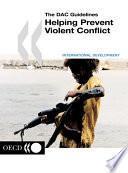The Dac Guidelines
Autores del Libro:
Resumen del Libro:

These Guidelines provide ways for donor governments to honour their commitmentto conflict prevention as an integral part of the quest to reduce poverty. They cover key issues such as: security, development and dealing withsmall arms, regional co-operation, peace processes, justice and reconciliation, engaging in partnerships for peace, working with business, andgrappling with the political economy of war – situations where powerful groups acquire a vested interest in sparking or perpetuating violent conflict.They identify concrete opportunities for donor assistance in support of peace that include: democratisation, inter-community relations, education and cross-cultural training, human rights training, freedom and access to information, the reintegration of uprooted populations, the demobilisation of former combatants, landmine clearing, and the restoration of a capacity for economic management.This full set of guidance on conflict prevention to date from the Development Assistance Committee (DAC) includes the 2001 Supplement and the ground-breaking 1997 Guidelines. This work marks a reaffirmation of the international communitys commitment to work together across government systems to improve their analyses of violent conflicts and establish more coherent policies. … We are promoting the consideration of conflict prevention in development assistance strategies with a view to achieving quicker and better co-ordinated assistance strategies – including the Heavily Indebted Poor Countries (HPIC) initiative – and ensuring a smooth transition from relief to post-conflict development. A significant example of such consideration is the April 2001 OECD/DAC Supplement to the 1997 Guidelines on Conflict, Peace and Development Co-operation. – Excerpt from the Conclusions of the G-8 Foreign Ministers meeting, July 2001.
Formatos Disponibles: PDF / EPUB
Opciones de descarga:
Si deseas obtener una copia del libro puedes usar alguna de las siguientes opciones de descarga: